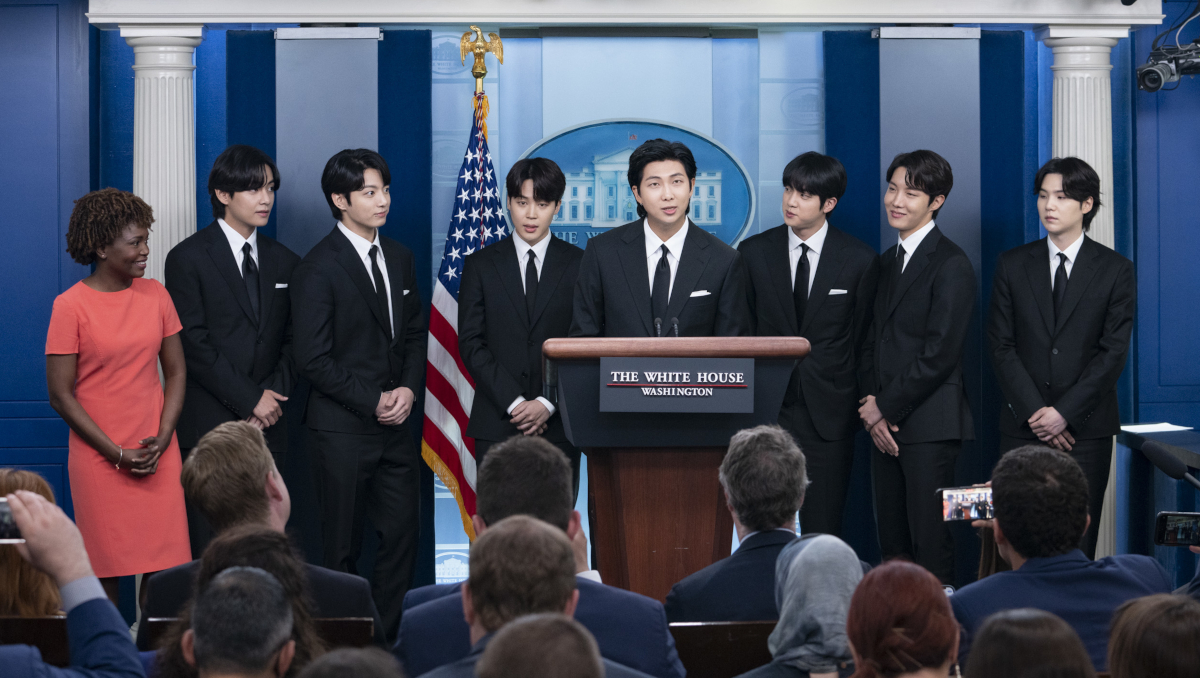
South Korea has intentionally integrated the growth of its cultural industry into its national development strategy through sustained government policy.
Hallyu, the international “Korean Wave” of pop culture, media, and entertainment, exemplifies how cultural exports can shape global perceptions and influence international relations. Beginning in the 1990s and proliferating after the mainstream successes of BTS, Psy’s “Gangnam Style,” the acclaimed film Parasite, and Netflix’s Squid Game, Hallyu draws worldwide attention to South Korean culture and entertainment. Korean dramas, movies, and music have become household staples not only in Asia but also across North America, Europe, and other regions. The quality and appeal of its creative industries drive global interest in Korean culture, and the South Korean government actively promotes Hallyu as a central pillar of its foreign policy and economic strategies. The government deliberately uses K-Pop idols in international relations, riding the wave of immense Hallyu popularity and contributing to a stronger perceived national security relationship between the United States and South Korea. Ultimately, South Korea serves as a notable case study of culture functioning as an instrument of national power, demonstrating how a nation can leverage its cultural assets to achieve broader strategic objectives.
South Korea has intentionally integrated the growth of its cultural industry into its national development strategy through sustained government policy. K-pop and K-dramas not only spread culture but also serve as a tool for statecraft. In 1998, former South Korean President Kim Dae-Jung implemented the “Hallyu Industry Support Development Plan” to boost economic recovery after the Asian financial crisis, increasing government spending on culture from $14 million in 1998 to $84 million in 2001. This shift marked a turning point, as the government recognized the potential of cultural industries to contribute to national development. Subsequent administrations have continued to provide economic incentives, further developing the cultural sector and realizing the long-term value of cultural exports. For example, in 2023, South Korea allocated approximately 790 billion won ($622.5 million USD) to support companies and startups enhancing cultural exports, reflecting its ongoing commitment to fostering innovation and competitiveness in the creative industries. The state deliberately engineered and invested in the cultural sector, pursuing a broader strategy to use culture as a means of national advancement.
Government-backed cultural exports have directly increased tourism, cultural influence, and revenue for South Korea’s industries. In the early 2010s, as Korean entertainment entered the mainstream of global media, the Ministry of Culture, Sports, and Tourism established the Cultural Contents Industry Promotion Committee. It announced the “First Basic Plan for Promoting the Cultural Contents Industry.” This unified government effort aimed to expand the reach of Hallyu content both domestically and internationally, setting clear goals for export growth and audience engagement. Tourism now ranks among South Korea’s largest economic sectors, generating jobs, revenue, and a national tourism policy framework. The surge in Korean content, supported by government investment, resulted in economic success—a clear overall benefit for South Korea.
Idols play a unique strategic role in South Korea’s international engagement. Unlike Western countries where celebrities often act independently, South Korea frequently assigns idols to represent national interests in international relations. The government leverages these cultural icons as literal representatives of modern Korean culture, using their popularity and influence to further South Korea’s interests abroad. South Korea sees idols as ambassadors who can bridge cultural gaps, foster goodwill, and project a positive image of the nation to global audiences. Their involvement in official state functions, international events, and humanitarian campaigns amplifies the reach and impact of Korean soft power.
BTS, the most influential K-pop group, exemplifies the use of idols in international engagement. Former South Korean President Moon Jae-in appointed BTS as a “Special Presidential Envoy for Future Generations and Culture,” leading to BTS’s speech at the United Nations (UN) on the Sustainable Development Goals. Such direct representation by pop culture icons rarely occurs at the UN and probably elevated South Korea’s international presence. BTS’s participation in global forums showcases their artistic talents and signals the country’s commitment to addressing pressing global issues, such as youth empowerment, mental health, and sustainable development. Since November 2017, BTS has also partnered with UNICEF for the “Love Myself” campaign, raising about $6.6 million USD as of March 2024 to support children’s mental health. BTS’s massive fanbase—known as ARMY—has fueled the campaign’s global reach and demonstrated the potential for pop culture to drive meaningful social change.
In another milestone of international outreach, BTS visited President Joseph Biden at the White House in May 2022 to address anti-Asian hate crimes, marking an unprecedented instance of direct engagement by foreign celebrities. This event highlighted the group’s ability to influence public discourse and promote cross-cultural understanding at the highest levels of government. While not all of BTS’ activities constitute direct state-mandated engagement in international relations, their global influence consistently enhances South Korea’s image. The government does not control culture outright, but benefits from Korean culture spreading. Large fan bases for groups like BTS show their reach to address global issues and foster international solidarity.
Other K-pop groups also contribute to international outreach efforts on behalf of South Korea. In 2019, the boy group EXO, accompanied by former President Moon Jae-in, met President Donald Trump during the G20 Summit, presented signed albums, and engaged with the Trump family. While EXO’s specific international role was not publicly detailed, their presence fostered a hospitable environment for positive U.S.-Korean relations and demonstrated the soft power of Korean pop culture in high-level international settings. The group’s interaction with world leaders at such a significant event underscores the symbolic importance of cultural ambassadors, and their ability to humanize and personalize international relationships.
Through idol groups, South Korea has improved inter-Korean relations, demonstrating that cultural engagement can touch both leaders and populations.
Red Velvet’s 2018 performance in Pyongyang, the North Korean capital, stands as a powerful example of cultural engagement. The group performed for hundreds of North Korean citizens and met with North Korean President Kim Jong-un, who expressed gratitude for their “gift to Pyongyang’s citizens” and said he was “deeply moved” by the performance, which included both North and South Koreans singing “Our Wish is Unification.” North Korean state media highlighted the event’s role in deepening understanding between the two Koreas. Kim’s support for further cultural exchanges underscores the success of South Korea’s strategy in international relations. Through idol groups, South Korea has improved inter-Korean relations, demonstrating that cultural engagement can touch both leaders and populations. Strategic empathy and finding common ground through shared cultural experiences serve as crucial prerequisites for further engagement, fostering mutual understanding and paving the way for more meaningful dialogue. This rare moment of goodwill on the Korean peninsula suggests that shared artistic experiences can pave the way for dialogue and reconciliation.
South Korea’s cultural exports have significantly improved Western perceptions of the country. Western audiences, especially Americans, now engage with Korean music, film, beauty products, food, video games, and fashion at unprecedented levels. The global success of Korean brands, ranging from cosmetics to technology, amplifies the positive associations created through Hallyu. This trend aligns with the concept of “nation branding” which means making a conscious effort to shape a nation’s global image. Often, a state’s perceived soft power outweighs its actual influence. By investing in cultural exports, South Korea has successfully cultivated a favorable identity among Western audiences, enhancing its reputation and impact on the world stage.
Recent data underscores the effectiveness of South Korea’s nation branding strategy with the West. As of 2023, this approach correlated with a higher perceived presence in world affairs and a stronger perceived national security relationship with the United States. According to a Crown Center study, Americans rated South Korea’s global influence at 5.1 out of 10 in 2023, up from 4.5 in 2021. The perceived strength of the U.S.-South Korea security partnership is high, with 71% of Americans viewing it as beneficial, ranking just behind Japan and Germany. While political and economic factors also contribute, these perceptions closely align with South Korea’s cultural influence strategy, demonstrating the tangible impact of Hallyu on international relations. The positive image cultivated by Hallyu has made it easier for South Korea to pursue its objectives, attract foreign investment, and build strategic alliances. The continued rise in South Korea’s favorability ratings suggests that its cultural efforts remain effective and sustainable in the long term.
South Korea’s strategic promotion of cultural exports has become a powerful instrument of national power. The government’s consistent support for the entertainment industry through funding and initiatives has driven economic growth, tourism, and positive international perceptions. K-pop idols have proven effective as agents of cultural engagement, advancing nation branding and strengthening international relationships. The success of Hallyu illustrates how culture can serve as an effective instrument of national power, shaping global identity and enhancing a nation’s standing in the international community. As South Korea continues to innovate and expand its cultural offerings, it will likely grow its influence on the global stage, providing a model for other countries seeking to harness the power of culture for national advancement. Through its unique blend of government support, creative talent, and international outreach, South Korea demonstrates that cultural exports both entertain and serve as a strategic asset capable of transforming a nation’s fortunes and reputation worldwide.
Stephanie Sellers previously served as the Central Intelligence Agency (CIA) Representative to the U.S. Army War College and is the former General Walter Bedell Smith Chair of National Intelligence Studies. She has twenty-seven years of experience in the U.S. Government as an intelligence educator; tradecraft facilitator; analytic manager; military and science and technology analyst; and missile system engineer.
Qingan Leasure is a junior at Seton Hall University studying Diplomacy & International Relations and Mathematics. He has previously served as an intern for the U.S. Army War College and is interested in pursuing a career in the fields of national security, intelligence, and foreign policy.
The views expressed in this article are those of the author and do not necessarily reflect those of the U.S. Army War College, the U.S. Army, or the Department of Defense.
Photo Description: The K-Pop band BTS joins White House Press Secretary Karine Jean-Pierre on Tuesday, May 31, 2022, in the James S. Brady Press Briefing Room at the White House.
Photo Credit: Official White House Photo by Erin Scott





Question No. 1: If the South Korean contemporary cultural matters, noted in the article above, can considered to be “important instruments of (in this case Korean) national power,” then should we consider that these exact such “important (cultural) instruments of national power” have more of a left-leaning aspect/origin, a more right-leaning aspect/origin, or some other (for example, “neutral” or “foreign”) aspect/origin?
Question No. 2: Likewise, if American contemporary cultural matters — which are of a generally similar nature and/or character to the Korean cultural matters noted in the article above — if these such American contemporary cultural matters can also be considered to be “important instruments of (in this case American) national power,” then — in this specific American case also — should these such “important instruments of (in this case American) national power” be considered as having a more left-leaning aspect/origin, a more right-leaning aspect/origin, or some other (for example, “neutral” or “foreign”) aspect/origin?
Herein to consider, more generally, whether or not more left-leaning, more right-leaning, and/or more “neutral” or “foreign” cultural matters — possibly all at the very same time and all in the very same country — can be — together with one another — considered to be — shall we say “culturally compatible” — “important instruments of national power?”)
Additional question — in consideration of my initial comment/questions above:
If certain of a country’s left-leaning cultural matters (for example, often associated with certain countries’ entertainment industries?), certain of a country’s right-leaning cultural matters and/or certain of a country’s neutral and/or foreign cultural matters — if any and/or all of these — in varying degrees and at various times — can be said to have had/still have “important instrument of national power” value,
Then, in circumstances such as these — and with this exact such critical knowledge and information standing starkly before said country — then does it not behoove said country NOT to excessively damage or destroy ANY PORTION of its such — diverse — and thus exceptionally valuable/invaluable/flexible over time — cultural — “instrument of national power” arsenal?
(This would seem to be something of a “no-brainer.” Yes?)
From the final paragraph of our article above:
“South Korea’s strategic promotion of cultural exports has become a powerful instrument of national power. The government’s consistent support for the entertainment industry through funding and initiatives has driven economic growth, tourism, and positive international perceptions.”
Questions: As with the S. Korean government above, did the United States government consistently support — through funding and initiatives — the United States’ entertainment industry? And did this exact such consistent U.S. government funding and support — of the U.S.’s entertainment industry — provide that our cultural exports would, ultimately, become the most powerful — cultural — instruments of national power in the world?
From the Korean Economic Institute of America (KEI) blog The Peninsula, a February 4, 2025 article entitled “US Public Opinion on Hallyu and Implications for Korean Soft Power” by author Je Heon (James) Kim:
“Hallyu Consumer Profile:
According to the Korea Foundation and the ROK Ministry of Foreign Affairs, the number of Hallyu fans in 2023 was about 225 million, which was nearly a five-fold increase from 46 million in 2012. By region, Asia and Oceania accounted for 66 percent of fans and clubs, while the United States accounted for about 16.7 million fans. The ROK Ministry of Culture, Sports, and Tourism reported in 2020 that the main consumers of Hallyu were Asian women between the ages of 29 and 31. …
Looking at KEI’s annual survey of the US public from 2024, we do not see evidence of any strong correlation between consumption of Hallyu content and gender, region, marital status, income, or education. However, there is a robust relationship between age and all content genres—the logit regression coefficients for age on various content modes are negative and more than two standard deviations away from zero (Figure 1). In other words, younger individuals tended to be consistently more interested in Korean television programs, popular music, and movies. There is also some evidence that suggests urbanicity, education, ideological orientation, and political leanings may also be associated with interest in Hallyu. For instance, individuals who were more educated, leaning liberal, and/or lived in or near metropolitan areas tended to be more interested in Korean TV, music, and movies.”
Question — based on my comment immediately above:
If, much like the U.S. above, much of the rest of the world’s population — that is interested in Korean TV, music, movies, etc. — if these such “much of the rest the world’s populations,” also, are to be found most often to be of the more educated, the more liberal leaning, and/or the more lived in or near a metropolitan area variety/kind,
Then, if this is indeed is the case, then might we say that (a) Korean Hallyu’s international appeal may relate more to its more modern content, its more modern focus and/or its more modern stance and (b) less to its, shall we say, more traditional content, more traditional focus and/or its more traditional stance?
(Or, in the alternative, does the focus on, and the depiction of, the more traditional aspects of Korean culture, does this such focus and depiction (if such does significantly occur) play a more important role — and/or indeed the dominant role — in the achievement of Korean Hallyu’s international appeal?)
As to the appeal of Hallyu, and the suggestion that it has become an important instrument of S. Korean national power, what are we to take (if anything) from the following observations:
1. From “The Academic,” a December 25th, 2024, article “The Korean Wave: A global phenomenon demystified: Explore how Hallyu Tracker decodes the global appeal of South Korean culture through AI-driven insights into cultural, social, and economic influences,” by Natalia Grincheva:
“The appeal of the Korean Wave to different cultural communities extends far beyond cultural and social proximity. Many global K-Idols, such as BTS promote universal human rights and freedom of expression, strongly aligning with universal liberal values. …
This raises an interesting hypothesis: while a country might resist universal liberalism due to its political regime and media infrastructure, this does not necessarily translate into its population’s pursuit of universal human rights, needs, and behavioural norms—those promoted through Hallyu content.”
2. From the “Asian Journal of Women’s Studies,” Volume 28, Issue 4, 2022, an article entitled “Feminist themes in Hallyu 4.0: South Korean TV dramas as a reflection of a changing sociocultural landscape,” by Björn Boman.
“A typical Korean and East Asian attribute is the moderate modernity which Lee (Citation2013) has underlined. Although more realistic than the prototypical K-drama, one finds little of anything vulgar or sexual in “Live.” (a K-drama). The main characters are modest, moral, and sexually restrained, which is not typical of the majority of the western TV series, but indeed so of K-drama. This demonstrates a hybrid element as it shows the merging or juxtaposing of a Korean modernity and western modernity, imposed or imported from the global realm where America is the major source of inspiration (Boman, Citation2021a; Lie, Citation2014). Overall, there are some distinctive feminist themes in “Live.” These are evident in how Han Jeong, the main female protagonist, is engaged with women’s issues, female victims, and the representation of career or work equilibrium element, all manifestations of a changing social landscape. Some portrayal of such perspectives in the content of these shows would have been unthinkable a few decades ago.” (The explanation of “a K-drama,” placed in parenthesis at the end of the second sentence in this quoted matter, this such in parenthesis item is mine.)
Culture exports are effective ways to eradicate communism. War, battle, and political maneuvers will not change the communist mindset. Culture exports will change people’s mindset; thus, it will change the whole country’s thinking into a capitalistic point of view.